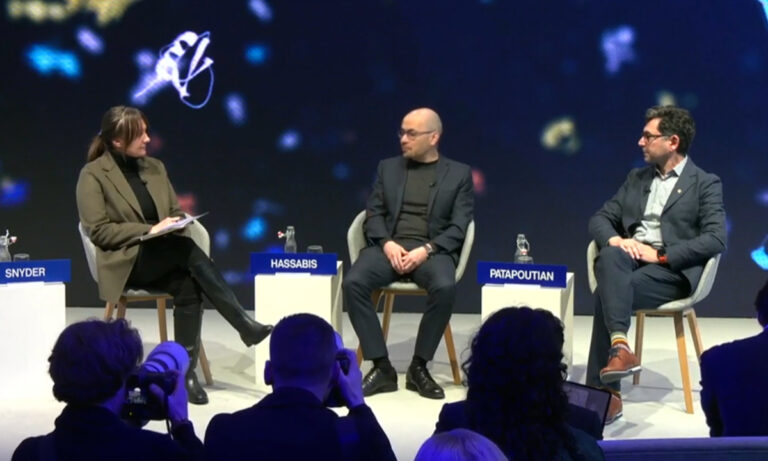Nobel laureate and Google DeepMind CEO Demis Hassabis said on Tuesday (January 21) that he expects drugs designed with artificial intelligence (AI) to enter clinical trials by the end of the year.
During a fireside chat at the World Economic Forum in Davos, Switzerland, Hassabis said the drugs were developed at Isomorphic Labs, a for-profit venture founded in 2021 by Google’s parent company Alphabet. He said that First principles and AI-driven.
“That’s the plan,” Hassabis said.
While large-scale language models are in the spotlight, the field of AI applied to science is “much richer than just language models and things like AlphaFold,” Hassabis said. AlphaFold2, for which he and colleague John Jumper won the Nobel Prize in Chemistry in 2024, is an AI model that predicts the 3D structure of proteins and solves half a century of biological challenges.
Erdem Pataptian, a professor of neuroscience at Scripps Research and winner of the 2021 Nobel Prize in Physiology or Medicine, who joined Hassabis on the panel, called the AlphaFold “one of the most amazing things I’ve ever experienced.” “This is one of the most rapid advances in science.” He said it was required 25 years ago to earn a Ph.D. Students spend five years investigating the structure of proteins. With AlphaFold, “you just enter the sequence and it tells you the structure,” he said.
Hassabis said AlphaFold has now predicted the structures of 200 million proteins known to science. This would have taken an estimated one billion years using traditional methods. The latest version of AlphaFold3 has expanded the ability to analyze interactions of proteins with other proteins, ligands, and DNA/RNA.
AI comes full circle
Patapoutian also highlighted the potential of AI to unlock the mysteries of brain function, especially in understanding complex neural patterns and their relationship to behavior. He noted that while current technology can predict the behavior of simple organisms, understanding the more complex brain remains a major challenge that AI could help solve.
“Overall, neuroscience is very excited about AI,” Patapoutian says. “Despite decades of research, we still don’t really understand how the brain works,” so scientists believe that understanding the brain could help move forward. be.
Even after observing the patterns in which neurons fire in the brain, it is still difficult to predict what behavior will occur next. Perhaps something as simple as a worm, which has only 300 neurons, could do that, Patapoutian said. But for more complex ones, he says, “we just don’t know. Predicting not just behavior, but more complex thinking, intelligence, and consciousness has been one of the holy grails of neuroscience.”
Hassabis said that in this sense, AI has come full circle. The structure of the brain has inspired neural networks in AI, and now AI is helping scientists understand how the brain works.
Hassabis said the next frontier for AlphaFold3 is understanding how mutations cause changes in protein structure and function. Although AlphaFold2 solved the protein static problem, he pointed out that proteins are not static. Ultimately, he sees the arrival of personalized medicine, where drugs are optimized for each individual’s metabolism.
Virtual cell and AGI
Looking to the future, Hassabis outlined a vision for “virtual cell” simulations that could revolutionize biological research. Traditionally, Pataptian said, the way to find the structure of a protein is to pull it out of the cell. However, its natural location within the cell is unknown. Patapoutian added that being able to see the whole cell and where the proteins are located would provide more useful information.
For example, Patapoutian said, if you can see a protein inside a cell, you might be able to see that it is localized at the tip of a neuron, for example, where a particular activity is occurring. “That will give you a very different understanding than, say, just the level of expression.”
Patapoutian also wondered where Hassabis sourced the data to train his AI models. Beyond public datasets, Hassabis said there are companies that can be hired to generate specialized data to fill in the gaps. His team also uses synthetic data that they generate themselves. Conversely, you can develop algorithms that require less data to train. This is to imitate humans who can generalize based on a few examples.
Asked when artificial general intelligence (AGI) will arrive, Hassabis said those who say it will arrive in the next few months may have an ulterior motive: they need to raise money. . “AI is overvalued in the short term, but I think it is still undervalued in the medium to long term.” He believes AGI could become a reality within five to 10 years. But first some big breakthroughs need to happen.
These breakthroughs, Hassabis said, are a well-developed skill set of reasoning and planning, and the ability to be truly creative, rather than just copying a trained art style or novel ideas. “Could Einstein come up with a theory of general relativity based on the knowledge he had at the time in the 1900s? I don’t think any of our systems could come close to this.”



